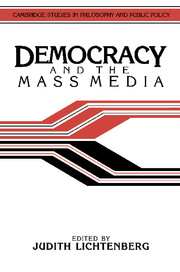Book contents
- Frontmatter
- Contents
- Preface
- List of contributors
- Introduction
- 1 Liberal constraints on private power?: reflections on the origins and rationale of access regulation
- 2 Liberalism and free speech
- 3 Foundations and limits of freedom of the press
- 4 Why the state?
- 5 Practices of toleration
- 6 Access in a post–social responsibility age
- 7 Who decides?
- 8 Four criticisms of press ethics
- 9 Political communication systems and democratic values
- 10 Mass communications policy: where we are and where we should be going
- 11 Content regulation reconsidered
- 12 The rationale of public regulation of the media
- 13 The role of a free press in strengthening democracy
- Index
6 - Access in a post–social responsibility age
Published online by Cambridge University Press: 05 June 2012
- Frontmatter
- Contents
- Preface
- List of contributors
- Introduction
- 1 Liberal constraints on private power?: reflections on the origins and rationale of access regulation
- 2 Liberalism and free speech
- 3 Foundations and limits of freedom of the press
- 4 Why the state?
- 5 Practices of toleration
- 6 Access in a post–social responsibility age
- 7 Who decides?
- 8 Four criticisms of press ethics
- 9 Political communication systems and democratic values
- 10 Mass communications policy: where we are and where we should be going
- 11 Content regulation reconsidered
- 12 The rationale of public regulation of the media
- 13 The role of a free press in strengthening democracy
- Index
Summary
Nearly thirty-five years after the landmark report by Robert Hutchins and his Commission on Freedom of the Press, Barbara W. Hartung published in the Journalism Quarterly an article examining the “Attitudes Toward the Applicability of the Hutchins Report.” She concluded, “It is somewhat startling to find how contemporary the directives of the Commission are and how unchanging the problems of the press in America appear to be.”
Hartung's observations remain applicable to this day. In her Introduction to this volume, Judith Lichtenberg identifies central issues in contention today as those that “have to do with diversity in and access to the press.” They include “the availability of the press to diverse points of view, to perspectives other than those of a privileged and powerful minority,” and “a lack of significant diversity of opinion and points of view represented in the news and public affairs coverage of the mass media.”
As Hartung might note, this complaint is strikingly similar to the classic statement drafted in the mid-i94os by the thirteen-member commission headed by Hutchins, who was then chancellor of the University of Chicago. The commission's report, on its first page, went straight to the issue of access. It charged that the press is “available to a small minority of the people only” and that “the few who are able to use the machinery of the press as an instrument of mass communication have not provided a service adequate to the needs of society.”
- Type
- Chapter
- Information
- Democracy and the Mass MediaA Collection of Essays, pp. 186 - 201Publisher: Cambridge University PressPrint publication year: 1990
- 10
- Cited by

